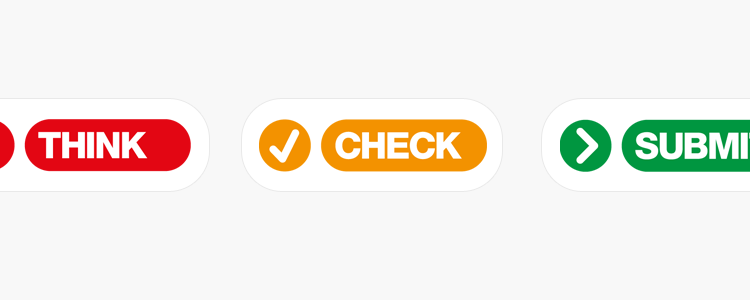Think Check Submit: A New Approach to Journal Selection

The rapid shift from print to digital publishing in the last decade has ushered in an unprecedented growth in scholarly journals and overall publications. Many in academia, particularly early career researchers, feel increasingly overwhelmed by the myriad choices now available to them online. All active researchers, at one point or another, must ask themselves, “Where should I submit my manuscript for others to read?” The answer to this question has never been a trivial matter in science, but it is now more important than ever.
Rise of the Predatory Journal
We know that the ideal journal target should match—as best as possible—your research subject area and the scope, rigor, and significance of your findings with the intended readership and aspired recognition of your work. On top of this, journal selection must consider journal quality. Unfortunately, alongside new legitimate and noteworthy journals, a disturbing number of fraudulent, deceitful ones have emerged.
Driven solely by profit, and not tied to any form of ethics, these counterfeit journals and their publishers are collectively known as “predatory”. They function, by using spam, seemingly-proper titles, and alluring promises of fast return times, to prey on unsuspecting scholars under pressure to publish by charging money for publishing their paper in an open access format—with little, to no, real or rigorous peer review and editorial oversight. By one count, such published papers have increased seven-fold between 2010 and 2014, going from 60,000 to 420,000 articles using a sample 613 journals. They present a growing threat to the integrity of science and knowledge, whose trust by the public and society is vital.
A New Campaign
As research volume continues to grow, it is hard to keep up with all the new journals out there, and authors must be on guard against predatory journals lurking out there. However, there exists a promising initiative to help in this endeavor, called “Think.Check.Submit.”. Launched by key publishers and industry organizations in 2015, this campaign aims to guide researchers by giving them better information of their publishing options. Specifically, the campaign strives to simplify the journal selection process faced by providing researchers with a handy toolset to wisely choose a trustworthy journal that is right for them.
The website is freely accessible and the toolset given is simple to follow.
Step 1 (Think): Answer the starter questions that makes you “think” about your target journal.
Step 2 (Check): You are linked to a “check” list of criteria that every author should consider using. Herein, some pertinent questions are provided; for example, “Do you or your colleagues know the journal” and “Do you recognize the editorial board?”. The latter consideration may be quite telling, as it is a good way to filter out predatory journals in your selection process.
Step 3 (Submit): After answering “yes” to all the check list questions, you may proceed and “submit” your paper.
Importantly, it is clearly emphasized that Think.Check.Submit does not aim to recommend any particular or set of journals to authors. Indeed, on the whole, the aim of this important initiative is to guide researchers in how they evaluate where to publish their work so as to improve their research impact and future career development.
Who Does it Benefit?
The Think.Check.Submit initiative, which is managed by TBI Communications, can potentially benefit multiple parties.
- Researchers in general stand to benefit the most immediately, mainly from the recommended criteria and greater information accessible to them in one place.
- This global campaign will also benefit those in the early stages of their career for whom English is a second language or based at institutions lacking full access to reputable scholarly literature. These researchers are likely to be most vulnerable to predatory journals, of which 8000 were active in 2014 according to one cited estimate.
- Over time, as awareness grows and the campaign gains momentum and traction, it is expected that publishers and librarians alike should benefit, in part from the supporting materials made available.
- Also, honest, reputable publishers, may lose fewer quality submissions from honest, hard-working researchers to predatory journals, and likewise not have their industry standards sullied by the latter in the eye of the public.
- The advancement of various scholarly disciplines should benefit too, as researchers become more selective and vigilant when choosing a journal to publish in, so that only sound science is published.
- This should, on the whole, benefit society and policy-makers in the long-term as bad science is justifiably marginalized.
Early Success and the Future
Given the number of publishing organizations that have joined the coalition (e.g., ALPSP, DOAJ, ISSN and SPARC) to support the Think.Check.Submit initiative, along with its growing online presence and recognition, there is hope that it will be a long-term success. Although the number of academic journals competing for scholarship, for which researchers compete to publish in, is growing rapidly at 3.5% annually, ensuring quality scholarship, especially in an expanding open-access environment, is probably a never-ending task. There needs to be more regulation and oversight to complement the Think.Check.Submit initiative, and authors could also freely check Directory of Open Access Scholarly Resources (ROAD) and Quality Open Access Market (QOAM).
Importantly, researchers must clearly bear some responsibility in the fight against malpractice and deception perpetuated by predatory journals. The Think.Check.Submit. Initiative and philosophy offers a much-needed potent arsenal against such predatory publishers.
References
- Carl Straumsheim (2015, October 1) ‘Predatory’ Publishing Up. Retrieved from https://www.insidehighered.com/news/2015/10/01/study-finds-huge-increase-articles-published-predatory-journals
- Ruth Francis (2015, October 1) Check. Submit. A helpful checklist for researchers. Retrieved from https://blogs.biomedcentral.com/bmcblog/2015/10/01/think-check-submit/
- Kelly Neubeiser (2016, January 29) Think. Check. Submit your way to the right journal. Retrieved from https://hub.wiley.com/community/exchanges/discover/blog/2016/01/29/think-check-submit-your-way-to-the-right-journal










Hurrah, that’s what I was seeking for, what a stuff!
existing here at this blog, thanks admin of this web
site.